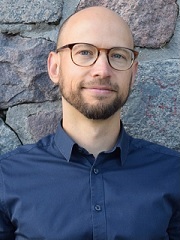Dr. Markus Dressel

Markus Dressel is a philosopher of science. He holds a masters degree in philosophy, sociology and history from Technische Universität and Humboldt-Universität Berlin, and a PhD in philosophy from Leibniz Universität Hannover. He has held research and teaching positions in Hamburg, Hannover, Graz, Berlin, and Tempe/Pheonix. He has also completed a traineeship in science communication. Markus is currently Director of the International Science Program at Körber-Stiftung in Hamburg, which includes responsibility for the Körber European Science Prize and the Hamburg Science Summit. He is also a member of the editorial team of the public philosophy platform PhilPublica and teaches philosophy of science at Universität Münster's Zentrum für Wissenschaftstheorie and the ICSS program at Universität Hamburg.
In his research, Markus focusses on the relation between science and society, particularly in the context of scientific policy advice, co-creative ('transdisciplinary') research, and decision-making under uncertainty. His work explores both the role that science should play in social contexts, e.g. in the public or political sphere, and the influence that social actors and social values should have on science as an epistemic enterprise. A major emphasis of Markus' research lies in exploring philosophical questions surrounding scientific objectivity and the role of value-judgements in science. His current work includes the development of a survey-based tool that assesses philosophical background assumptions of actors in science-society interactions (transdisciplinary teams, scientific advisory panels etc.).
Besides his specialization in philosophy of science, Markus has a background in political and social theory, especially with regard to the works of Jürgen Habermas. He has also collaborated with colleagues from a wide range of disciplines, such as sociology, economics, climate science, evaluation science or psychology. His methodological approaches include established philosophical styles of analysis, both from the analytic and the continental tradition. In addition, he has worked with (mostly qualitative) social science methods.
Publications (selection)
Dressel, M. (2024). Chap. 3.3: Three broad SPI models. In FAO (Ed.), Guidance on strengthening national science–policy interfaces for agrifood systems (pp. 40-43). https://doi.org/10.4060/cd3125en
Dressel, M. (2024). Annex 3: The toolbox method. In FAO (Ed.), Guidance on strengthening national science–policy interfaces for agrifood systems (pp. 113-117). https://doi.org/10.4060/cd3125en
Dressel, M. (2023). Die Fakten sprechen lassen: Werte und Wertfreiheit in gesellschaftlich relevanter Forschung (Dissertation). Gottfried Wilhelm Leibniz Universität Hannover. https://doi.org/10.15488/13199
Dressel, M. (2022). Models of science and society: Transcending the antagonism. Humanities and Social Sciences Communications, 9, 241. https://doi.org/10.1057/s41599-022-01261-x
Dressel, M. (2022). Inductive Risk: Does it Really Refute Value-Freedom?. THEORIA, 37, 2, 181-207. https://doi.org/10.1387/theoria.22795
Suhari, M., Dressel, M., & Schuck-Zöller, S. (2022): Challenges and best-practices of co-creation: A qualitative interview study in the field of climate services. Climate Services, 25. 100282. https://doi.org/10.1016/j.cliser.2021.100282
Dressel, M., & Held, H. (2022). Klimakrise und tiefe Unsicherheit: Welche Antworten bietet die Theologie?. WiSo Working Paper Series, 73. https://www.wiso.uni-hamburg.de/forschung/forschungslabor/working-papers/pdfs-wp/wp73.pdf
Dressel, M. (2022). Modelle des Wissenschafts-Gesellschafts-Verhältnisses und ihre Hintergrundannahmen. GERICS-Report 35. Climate Service Center Germany. https://www.climate-service-center.de/imperia/md/content/csc/gerics_report_35_update.pdf
Schuck-Zöller, S., Bathiany, S., Dressel, M. et al. (2022). Developing criteria of successful processes in co-creative research. A formative evaluation scheme for climate services. fteval Journal for Research and Technology Policy Evaluation, 53, 43-56. https://repository.fteval.at/id/eprint/601
Teaching
Summer 2025: Objectivity, Values, and Stakeholder Participation: Philosophical Considerations, U Hamburg
Winter 2024/25: Follow the science? Philosophische Perspektiven auf das Verhältnis von Wissenschaft und Politik, U Münster
Summer 2024: Science-society models, U Hamburg
Winter 2023/24: Wissenschaftliche Objektivität – Selbstverständlichkeit oder Chimäre?, U Münster
Winter 2022/23: Objektivität, Werte und Wertfreiheit in der Wissenschaft, U Hamburg
Summer 2015: Trügerisches Wissen, wissender Betrug, Humboldt U Berlin
Winter 2013/14: Wissenskulturen im Streit: Wie das Gehirn die Geister spaltet, Humboldt U Berlin
Winter 2012/13: Meine Psyche, mein Gehirn und ich - Der freie Wille als Illusion? (Teil II), Humboldt U Berlin
Summer 2012: Meine Psyche, mein Gehirn und ich - Der freie Wille als Illusion? (Teil I), Humboldt U Berlin
Winter 2011/12: Wenn Superman die Welt nicht rettet: Handeln und Nicht-Handeln in kollektiven Krisen (Teil II), Humboldt U Berlin
Summer 2010: Wenn Superman die Welt nicht rettet: Handeln und Nicht-Handeln in kollektiven Krisen (Teil I), Humboldt U Berlin
Academic projecs and events (selection)
2020-2023: Normativity, Objectivity and Quality Assurance of Transdisciplinary Processes, research project, Climate Service Center Germany (with U Hamburg)
2015-2022: Values and Value-Freedom in Socially Relevant Research, dissertation project, Leibniz U Hannover (DFG-GRK 2073)
2019-2020: Contextualizing Climate Engineering and Mitigation: Illusion, Complement, or Substitute? (CEMICS2/DFG-SPP 1689), research project, U Graz (with U Hamburg and PIK)
2017: Progress in Science and Society, author workshop with Philip Kitcher, Leibniz U Hannover (DFG-GRK 2073)
2015: Integrated Knowledge in Climate Research: Assessing the Epistemological Basis of Interdisciplinary Modeling, research project, U Hamburg (Cluster of Excellence CliSAP)
2015: Die nachhaltige Lösung des Klimaproblems: Welcher Umgang mit tiefer Unsicherheit ist ein der katholischen Tradition gemäßer?, research project, U Hamburg (Research Unit Sustainability and Global Change)
2013-2014: Invitation to Discourse: Normative Concepts in Transformation in the Arab Spring and Beyond, international summer school, Free U Berlin (with Goethe U Frankfurt & Cairo U)
2012: Akzeptanz sexueller Vielfalt an Berliner Schulen, research project, Humboldt U Berlin (Department of Psychology)
2011: Das Werk von Jürgen Habermas, author workshop with Jürgen Habermas, Humboldt U Berlin (Department of Philosophy)
2011: Re-Thinking Marx, international conference, Humboldt U Berlin (Department of Philosophy
